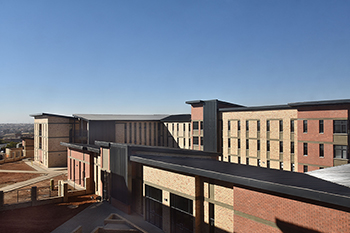Latest News Archive
Please select Category, Year, and then Month to display items
14 June 2024
|
Story Anthony Mthembu
|
Photo Suplied
 Jeremiah Hlahla, a UFS student completing his PhD in Botany at the University of Debrecen as part of an exchange initiative funded by the Erasmus+ Mobility Programme.
Jeremiah Hlahla, a UFS student completing his PhD in Botany at the University of Debrecen as part of an exchange initiative funded by the Erasmus+ Mobility Programme.
As part of an exchange initiative facilitated by the Erasmus+ Mobility Programme, Jeremiah Hlahla, a student at the University of the Free State (UFS), is nearing the completion of his PhD studies at the University of Debrecen in Hungary. Hlahla’s journey, which began in February 2024 and is set to conclude in July 2024, has been a remarkable learning opportunity. “As a first time-traveller to Europe, I have thoroughly enjoyed engaging with people from different countries and cultures,” he said.
The benefits of international collaboration
Hlahla is currently pursuing a PhD in Botany, focusing on plant stress physiology. “My current PhD project investigates the physiological, biochemical and morphological responses of vegetable-type soybean, or edamame, to combined drought and heat stress,’’ he explained. He considers the University of Debrecen the ideal institution to complete his research due to its extensive expertise and resources in similar projects. He noted that his colleagues at Debrecen conduct significant work on plant protection against biotic and abiotic stresses, including salt and drought stress, as well as proteins and amino acids in barley and other legumes.
Given the vast knowledge available on similar projects, Hlahla has found substantial engagement with his work at the University of Debrecen. “Upon arrival, I delivered an introductory lecture presenting my UFS project on the synergistic effects of combined drought and heat stress on the physiology and biochemistry of edamame. It was an engaging session as everyone could relate to my work and asked many questions,’’ he said.
Insights gained from the exchange
Hlahla has also gained valuable lessons that will assist him in his research career, including biotechnology and physiology tools. “I learned how to prepare samples and use high-performance liquid chromatography (HPLC) and reversed-phase ultra-high-performance liquid chromatography (UHPLC) to quantify proteins and amino acids,’’ he said. These techniques are beneficial not only for his current work but will also support future soybean research.
As his experience at the University of Debrecen nears its end, Hlahla reflects on the collaborations and friendships he has formed, which stand out as a significant highlight.
First residence for UFS South Campus
2016-09-01

The residence has 146 double rooms with 17 kitchens
overall, each corridor has one kitchen. The residence
also has a gazellie and a conference room that
can accommodate 50 people.
Photo: Charl Devenish
The South Campus of the University of the Free State in Bloemfontein now has its own student residence. Completed in June 2016, the new residence can accommodate 250 undergraduate and 20 postgraduate students.
The residence has 270 beds, with 20 single-bedroom flats and 12 additional single rooms in the corridors. Each of these single-bedroom flats has a kitchen, lounge, and a bathroom. There are 146 double rooms with 17 kitchens overall, each corridor has one kitchen. The residence also has a gazellie, a conference room that can accommodate 50 people, as well as eight laundry rooms with a drying area.
“Students at the South Campus have, up until now, been commuting from the Bloemfontein Campus and residential areas around town. We are extremely proud that accommodation will now be available to our students on the campus. Although the official opening of the residence is said to take place early in 2017, some students have already moved in,” says Prof Daniella Coetzee, Principal of the South Campus.
The residence was built at a cost of R57 million, which was funded by the UFS and the Department of Higher Education and Training.
Residence accessible to differently-abled people
The UFS strives to cater for differently-abled people by making all its buildings accessible to them. This residence is no exception, as it has two rooms available on the ground floor of Block C for differently-abled students. These rooms accommodate two students per room.
A one-of-a-kind newly installed water system
The residence is also the first at the university that has a grey-water system installed. Grey water is made up of bath, shower, and bathroom sink water. The water will then be reused for toilet flushing as well as for irrigation purposes on the campus.